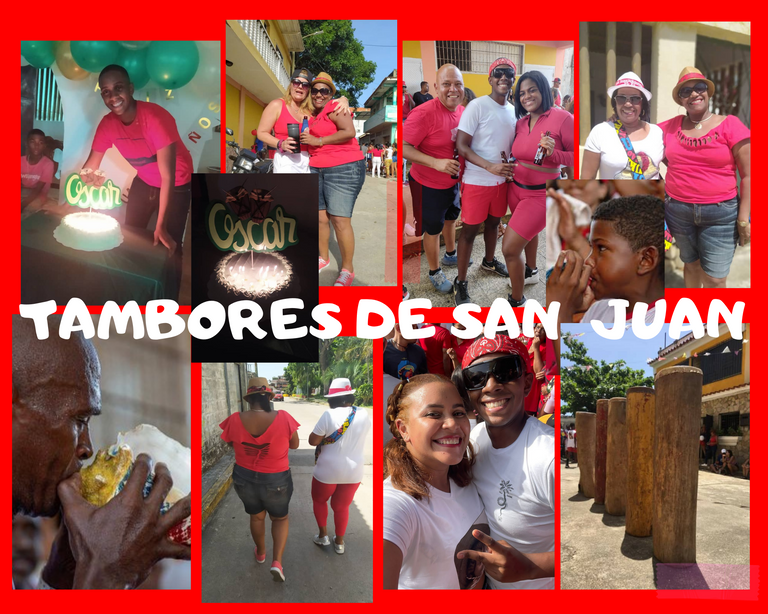
El baile de tambor es una cultura que heredamos de los esclavos traídos de África en la época de la colonia. Fuimos colonizados por los españoles, en consecuencia heredamos sus culturas y tradiciones. Antes de contarles mi disfrute celebrando las Fiestas de San Juan en mi pueblo natal La Sabana, Estado La Guaira; voy hablar un poquito de historia para ponerlos en contexto.

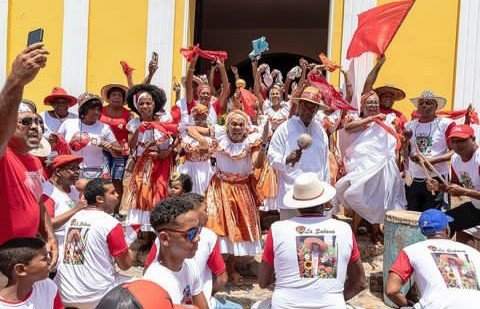
Para los que no saben, este género proviene de los africanos, ellos acostumbraban a realizar sus rituales y costumbres en los quilombos donde pernoctaban luego de cumplir con sus faenas diarias. Consiste en un baile de una pareja hombre y mujer en el centro de una rueda, ella con movimientos sensuales, mueve sus caderas al ritmo del toque de los tambores.

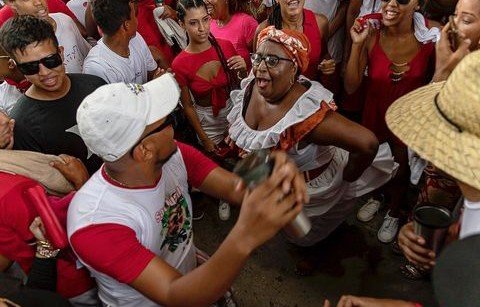
Él, por su lado, la aborda de manera sensual también y ella lo evade con sus rítmicos movimientos. Un pie lo coloca de puntilla y el otro lo usa para desplazarse en círculos alrededor de la rueda, combina el baile con movimientos de las manos, en la cintura o hacia arriba. El hombre por su parte hace insinuaciones como pidiendo con los brazos abiertos. Es un baile libre donde todos los asistentes participan, no hay tiempos, no hay orden solo las ganas de bailar al ritmo del toque de los tambores. Los tambores se realizan con troncos de madera sacados de árboles gruesos y en la punta son tapados con cuero de venado o chivo y sujetados con clavos por su alrededor. Antes de cada toque lo colocan frente al fuego, pequeñas fogatas que se hacen para que tense un poco el cuero y afinar el sonido. Este proceso dura aproximadamente 30 minutos. En ese sentido, los tamboreros usan la expresión: "Estamos calentando los cueros".

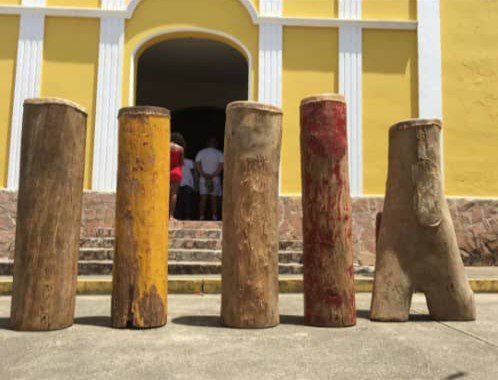
El 14 de diciembre de 2021 de manera oficial la Organización de las Naciones Unidas para la Educación, la Ciencia y la Cultura. (UNESCO) ratificó al Ciclo Festivo de Culto a San Juan Bautista como Patrimonio Cultural Inmaterial de la Humanidad. La fiesta patronal en honor a San Juan Bautista inició alrededor de hace 300 años, se desarrolla a través de más de 50 cofradías en los estados: Aragua, Carabobo, Yaracuy, Miranda, La Guaira y Distrito Capital.

Comienzan el 23 de junio durante el día, la noche y la madrugada se escucha el repicar de tambores para conmemorar el Natalacio de San Juan Bautista, es el segundo santo después del Niño Jesús a quien se le celebra su nacimiento. Esta fecha está muy relacionada con el solsticio de verano; se conoce como el día más largo del año porque es el inicio del verano.
En otros países como España lo llaman la noche de las fogatas. Ya que, tienen como costumbre encender fogatas en honor al astro sol, en torno a estas festividades se realizan varios rituales de acuerdo a los mitos y creencias de cada cultura. Por ejemplo en mi pueblo La Sabana, comienza el 23 de junio en el día; a partir de las 12:00 p.m. se realiza el primer repique de tambores frente la iglesia, por varias horas, no es muy largo; porque a las 12:00 a.m. en la Plaza que lleva su nombre, se hace otro repique advirtiendo a la población que ya es el día. Suenan los tambores durante varias horas.
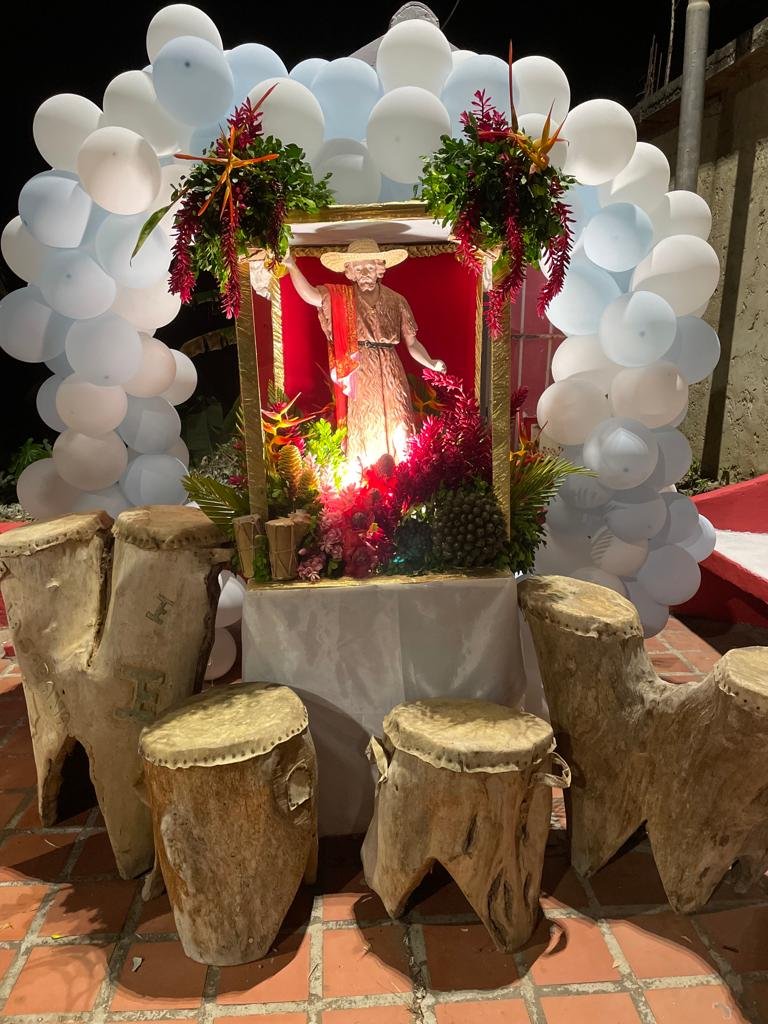
El día 24 de junio se colocan los tambores frente la Iglesia, se celebra una misa en honor a San Juan Bautista, cuando finaliza a las 12:00 p.m. Formalmente comienza la fiesta de tambores, a bailar San Juan son las expresiones que se oyen entre los nativos del lugar. En nuestro pueblo, hay varios toques que nos caracterizan: el primero es El Macizón, mientras lo tocan cantan: Macizón, Macizón, y la gente responde: dale, dale, dale... y luego tocan la Perra acompañada de La Guarura (Concha de un Caracol Grande) su sonido emite una energía que todos gritamos de alegría y cantamos: "to to fuera", es como un corrientazo que invita a bailar sin parar. Es la sensación que yo siento, y es la manera que se me ocurre para describirlo. 😁😉😂

Durante todo el día se toca tambor, luego se van moviendo los tambores a las diferentes esquinas del pueblo, este año tuvieron la gentileza de rendirle tributo a los grandes tamboreros que ya no están físicamente, pude observar también como las nuevas generaciones están ensayando y se están involucrando para aprender y seguir con nuestra tradición. El ambiente estaba cargado de mucho color, alegrías, energías y una vibración muy alta. Particularmente tenía más de tres años que no disfrutaba de las fiestas de San Juan y lo que sentí este año no encuentro palabras para describirlo.
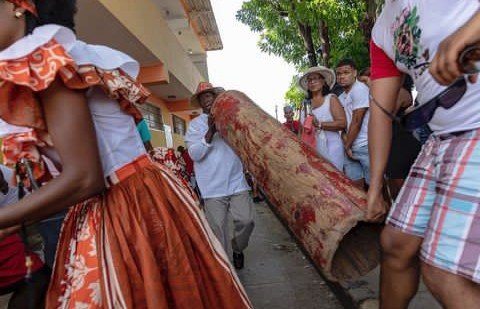
Para finalizar les quiero compartir que más que una fiesta es una tradición, es la cultura de mi pueblo, son las creencias de mis ancestros, es el linaje de mi familia, son los recuerdos de mis padres, es la alegría y el Sentir Sabanero, es el reencuentro de amigos, paisanos y familiares, que tenía mucho tiempo sin saber de ellos. Es muy hermoso volver a bailar tambor y compartir esta hermosa tradición. Por último y no menos importante cerramos el día con la celebración del cumpleaños de mi sobrino que desde que llegó hasta que se vino lo celebró en grande. Por esto y más gracias, gracias, gracias mi Dios.

Rosa Escobar, Iñaki Zugasti, Camila Acuña,
María José freites, Orestes Laya, y Zamary Laya
Las fotos y el vídeo fueron editados en Canva
Los separadores fueron editados en Canva
Traductor Deepl


Drum dancing is a culture that we inherited from the slaves brought from Africa in colonial times. We were colonized by the Spaniards, therefore we inherited their culture and traditions. Before I tell you about my enjoyment celebrating the Fiestas de San Juan in my hometown La Sabana, La Guaira State; I am going to talk a little bit of history to put it in context.


For those who do not know, this genre comes from the Africans, they used to perform their rituals and customs in the quilombos where they spent the night after fulfilling their daily chores. It consists of a dance of a male and female couple in the center of a wheel, she moves her hips with sensual movements to the rhythm of the drums.


He, for his part, approaches her in a sensual way and she evades him with her rhythmic movements. She places one foot on her toes and uses the other to move in circles around the wheel, combining the dance with hand movements, on the waist or upwards. The man, for his part, makes insinuations like asking with open arms. It is a free dance where everyone participates, there is no time, no order, only the desire to dance to the rhythm of the drums. The drums are made with wooden trunks taken from thick trees and at the top they are covered with deer or goat leather and fastened with nails all around. Antes de cada toque lo colocan frente al fuego, pequeñas fogatas que se hacen para que tense un poco el cuero y afinar el sonido. Este proceso dura aproximadamente 30 minutos. En ese sentido, los tamboreros usan la expresión: "We are warming up the hides".


On December 14, 2021 the United Nations Educational, Scientific and Cultural Organization. (UNESCO) ratified the Festive Cycle of Worship to San Juan Bautista as Intangible Cultural Heritage of Humanity. The patronal feast in honor of San Juan Bautista began around 300 years ago and is carried out by more than 50 brotherhoods in the states of Aragua, Carabobo, Yaracuy, Miranda, La Guaira and the Capital District.

They begin on June 23rd during the day, night and early morning the beating of drums is heard to commemorate the birth of St. John the Baptist, he is the second saint after the Child Jesus whose birth is celebrated. This date is closely related to the summer solstice; it is known as the longest day of the year because it is the beginning of summer.
In other countries like Spain it is called the night of bonfires. Since, they have the custom of lighting bonfires in honor of the sun, around these festivities several rituals are performed according to the myths and beliefs of each culture. For example in my town La Sabana, begins on June 23 in the day; from 12:00 p.m. the first peal of drums is performed in front of the church, for several hours, it is not very long; because at 12:00 a.m. in the Plaza that bears his name, another peal is made warning the population that it is already the day. The drums sound for several hours.

On June 24 the drums are placed in front of the church, a mass is celebrated in honor of San Juan Bautista, when it ends at 12:00 pm. Formally begins the festival of drums, to dance San Juan are the expressions that are heard among the natives of the place. In our town, there are several toques that characterize us: the first one is El Macizón, while they play it they sing: Macizón, Macizón, and the people respond: dale, dale, dale... and then they play La Perra accompanied by La Guarura (Concha de un Caracol Grande) its sound emits an energy that we all shout with joy and sing: "to to to fuera ", it's like a corrientazo that invites us to dance non-stop. That's the feeling I feel, and that's the way I can think of to describe it. 😁😉😂

This year they were kind enough to pay tribute to the great drummers who are no longer physically present. I was also able to observe how the new generations are rehearsing and getting involved to learn and continue our tradition. The atmosphere was full of color, joy, energy and a very high vibration. I had not enjoyed the festivities of San Juan for more than three years and what I felt this year I can't find words to describe it.

Finally I want to share with you that more than a party, it is a tradition, it is the culture of my people, it is the beliefs of my ancestors, it is the lineage of my family, it is the memories of my parents, it is the joy and the Sentir Sabanero, it is the reunion of friends, fellow countrymen and family, that I had long time without knowing about them. It is very beautiful to return to dance drums and share this beautiful tradition. Last but not least we closed the day with the celebration of my nephew's birthday, who from the moment he arrived until he left, he celebrated in style. For this and more thank you, thank you, thank you my God.

Rosa Escobar, Iñaki Zugasti, Camila Acuña,
María José Freites, Orestes Laya, and Zamary Laya.
The photos and video were edited in Canva.
The dividers were edited in Canva
Translator Deepl
▶️ 3Speak
Que bueno que pudiste ir y que te disfrutaste todo por allá. Que lindo video también el que hiciste y un excelente resumen de la celebración de San Juan jijiji
Gracias por visitar mi blog, por el comentario. Y porque te gustó.😀🙃🙃 Siii sabrooosooo bailar al toque de esos tambores. Excelente experiencia hay que vivirlo y sentirlo.
Muy grato leerte y conocer un poco más de tu pueblo y más acompañada de ésta bonita tradición san juanera. Muy bellas fotos que inspiran a querer estar allí. Tuve una grata invitación para asistir este año a la sabana para el San Juan pero por múltiple compromisos fue difícil concretar tiempo para ir. Espero poder visitar en algún momento tu lindo pueblo. Que siga el disfrute con amor y tradición 💕😘Este cooler esta en el colegio desde el día lunes cierre de proyecto celebración para los padre. Favor pasar por los grupos de representantes para ubicar a quien pertenece e informar que está en el área de tradición.💕🙌💞
Gracias amiga, eres bienvenida. Que lástima no pudiste ir, pero ya vendrán otras fiestas de San Juan, la cual podrás disfrutar. Gracias por visitar y comentar mi blog. Saludos😉
Gracias🙃🙂
Excelente post 20 puntos a tan grande creatividad y tu manera de describir cada detallé, acertada todas tus palabras. 😁🥳
Gracias por leer y comentar, san juanero😉🙂🙃